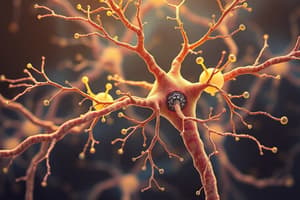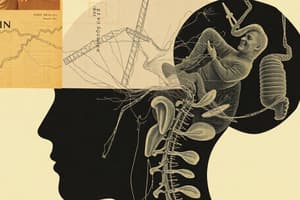Podcast
Questions and Answers
Which component of the reflex arc is responsible for detecting the stimulus?
Which component of the reflex arc is responsible for detecting the stimulus?
- Efferent neuron
- Integration center
- Afferent neuron
- Receptor (correct)
Which role do reflexes primarily play in motor control?
Which role do reflexes primarily play in motor control?
- Improving muscle endurance
- Generating voluntary movements
- Enhancing cognitive functions
- Maintaining posture and balance (correct)
What is the key difference between a conditional response and a reflex?
What is the key difference between a conditional response and a reflex?
- A reflex is learned, while a conditional response is innate
- A reflex is automatic, while a conditional response is learned (correct)
- A reflex requires synaptic plasticity, while a conditional response does not
- A reflex involves afferent neurons, while a conditional response does not
Which scientist is known for demonstrating the acquisition of a conditional response?
Which scientist is known for demonstrating the acquisition of a conditional response?
What is synaptic plasticity essential for, besides the strengthening or weakening of neural connections?
What is synaptic plasticity essential for, besides the strengthening or weakening of neural connections?
In the reflex arc, which component processes information received from the afferent neuron?
In the reflex arc, which component processes information received from the afferent neuron?
What occurs during neuron transmission?
What occurs during neuron transmission?
Which of the following best explains how synaptic plasticity influences reflexes?
Which of the following best explains how synaptic plasticity influences reflexes?
What is the function of the efferent neuron in the reflex arc?
What is the function of the efferent neuron in the reflex arc?
How does conditional response acquisition relate to synaptic plasticity?
How does conditional response acquisition relate to synaptic plasticity?
Flashcards are hidden until you start studying
Study Notes
Reflexes
Motor Control
- Reflexes are automatic responses to stimuli that involve the activation of motor neurons
- Motor control involves the regulation of muscle tone, posture, and movement
- Reflexes play a crucial role in maintaining posture, balance, and movement
Conditional Response
- Conditional response is a learned reflex that occurs in response to a neutral stimulus
- Ivan Pavlov's classical conditioning experiment demonstrated the acquisition of a conditional response
- Conditional response involves the association of a neutral stimulus with an unconditioned stimulus to elicit an unconditioned response
Synaptic Plasticity
- Synaptic plasticity refers to the ability of neural connections to change in strength based on experience
- Reflexes involve synaptic plasticity, which allows for the strengthening or weakening of neural connections
- Synaptic plasticity is essential for learning and memory, including the acquisition of conditional responses
Neuron Transmission
- Neuron transmission involves the release of neurotransmitters from the terminal end of a neuron
- Neurotransmitters bind to receptors on adjacent neurons, transmitting the signal
- Reflexes involve the rapid transmission of signals between neurons, allowing for swift responses to stimuli
Reflex Arc
- A reflex arc is the neural pathway involved in a reflex response
- The reflex arc consists of:
- Receptor: detects the stimulus
- Afferent neuron: transmits the signal to the central nervous system
- Integration center: processes the information
- Efferent neuron: transmits the signal to the effector organ
- Effector organ: responds to the stimulus (e.g., muscle contraction)
- The reflex arc allows for rapid, automatic responses to stimuli, often without conscious awareness
Reflexes
Motor Control
- Reflexes are automatic responses to stimuli that involve the activation of motor neurons, regulating muscle tone, posture, and movement
- Reflexes play a crucial role in maintaining posture, balance, and movement, enabling quick responses to stimuli
Conditional Response
- A conditional response is a learned reflex that occurs in response to a neutral stimulus, acquired through association with an unconditioned stimulus
- Ivan Pavlov's classical conditioning experiment demonstrated the acquisition of a conditional response, highlighting the role of learning in reflexes
Synaptic Plasticity
- Synaptic plasticity refers to the ability of neural connections to change in strength based on experience, allowing reflexes to adapt and learn
- Reflexes rely on synaptic plasticity to strengthen or weaken neural connections, enabling learning and memory, including the acquisition of conditional responses
Neuron Transmission
- Neuron transmission involves the rapid release of neurotransmitters from the terminal end of a neuron, binding to receptors on adjacent neurons to transmit the signal
- Rapid neurotransmission enables swift responses to stimuli, characteristic of reflexes
Reflex Arc
- A reflex arc is the neural pathway involved in a reflex response, consisting of a receptor, afferent neuron, integration center, efferent neuron, and effector organ
- The reflex arc enables rapid, automatic responses to stimuli, often without conscious awareness, by transmitting signals quickly between neurons and effector organs
Studying That Suits You
Use AI to generate personalized quizzes and flashcards to suit your learning preferences.



